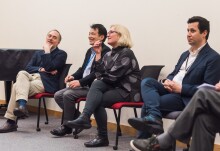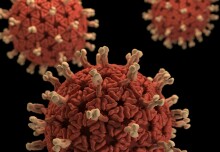

PERSONALISING COVID RISK
Personalising risk from COVID-19 key to protecting immunosuppressed people
New research underscores the need for ongoing COVID-19 protection for people with weakened immune systems.



Personalising risk from COVID-19 key to protecting immunosuppressed people
New research underscores the need for ongoing COVID-19 protection for people with weakened immune systems.


Genetic clues explain why children develop rare post-COVID condition
An Imperial-led study has highlighted how rare variants of a gene regulating the gut lining may increase the risk of MIS-C by up to four times.


Imperial’s human challenge study helps explain why some people don’t get COVID
New analysis based on Imperial’s COVID-19 human challenge study has helped to uncover how some people avoid getting sick.


Health risk from global warming predictor of city climate action during COVID-19
City officials were more likely to maintain climate action during the pandemic in places with more climate-related health issues affecting residents.


Long COVID leaves telltale traces in the blood
People with long COVID have distinct patterns of inflammation detectable in the blood, which could potentially be targeted with immune therapies.
 13
13


Feature
Eight things we learned about commercialising medical research at AYCI 2024
We learnt why you should channel Mary Somerville, how timing can make or break a startup, and other lessons from experts at All You Can Innovate 2024.


Imperial launches new online courses on virology and vaccinology
A new online Coursera series will explore how viruses infect us, how vaccines protect us and the latest cutting-edge infectious disease research.


Global human challenge consortium to push for next generation of vaccines
An international group of researchers specialising in human challenge studies is embarking on a project to develop advanced virus-blocking vaccines.


COVID-19 may have small but lasting effects on cognition and memory
COVID-19 may have an impact on people’s cognitive and memory abilities that lasts a year or more after infection.


T cells may provide more durable protection against Omicron than antibodies
New review suggests T cells are more robust against ‘Omicron breakthroughs’ than antibodies, offering fresh insights for COVID-19 vaccine development.